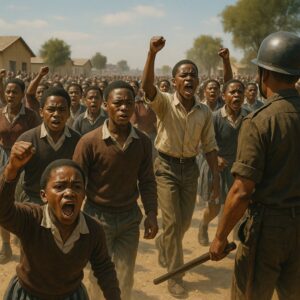June 16, 1976, was a day etched deeply into the history of South Africa and the global struggle for justice. On this day, thousands of Black students in the township of Soweto took to the streets to protest the oppressive apartheid government’s decision to enforce education in Afrikaans—a language many saw as the tongue of their oppressors. This peaceful march quickly turned into a brutal confrontation, sparking a nationwide movement that would shake the foundations of apartheid.
Apartheid was more than just segregation; it was a system designed to control every aspect of life for Black South Africans, enforcing racial inequality through laws and violence. Education was a key battleground in this war of oppression. The government’s Bantu Education policy aimed to prepare Black children for lives as laborers and servants rather than thinkers or leaders. This meant that education was being used as a tool to perpetuate the status quo, denying Black South Africans access to equal opportunities and stifling their potential.
The decree that Afrikaans be used alongside English in schools was seen as a direct attack on students’ identity and future. Afrikaans was not just a language; it was a symbol of oppression, associated with the ruling National Party and its policies of apartheid. For many Black South Africans, learning Afrikaans was tantamount to accepting and internalizing the racist ideology that underpinned apartheid.
Imagine being a young student in Soweto on that day—walking together with friends, hopeful for change, but facing the harsh reality of a regime determined to silence your voice. The peaceful protest quickly met police brutality; tear gas and live ammunition were unleashed on the crowd. Among those killed was 12-year-old Hector Pieterson, whose image, captured in a haunting photograph of a dying boy carried by a fellow student, became a symbol of resistance and sacrifice.
The Soweto Uprising ignited a fire across South Africa. Students, families, and activists joined in protests and strikes, refusing to accept an education system built on injustice. They demonstrated their determination to challenge the status quo and fight for their rights as human beings. The courage of those young protesters showed the world that the fight against oppression was not just political—it was deeply personal and urgent.
In the years that followed, the Soweto Uprising became a defining moment in the anti-apartheid movement, inspiring leaders like Nelson Mandela and fueling efforts that eventually led to apartheid’s downfall in the early 1990s. The uprising galvanized international awareness and condemnation of apartheid, highlighting its inherent cruelty and injustice.
It reminds us that sometimes, the voices of youth have the power to awaken a nation and change history. The Soweto Uprising was not just an isolated event; it was a catalyst for a broader movement for justice and equality in South Africa. It showed that ordinary people could make extraordinary sacrifices for a common goal and that even the most seemingly insurmountable obstacles could be overcome through collective action.
The impact of the Soweto Uprising cannot be overstated. It marked a turning point in the anti-apartheid movement, inspiring new waves of protests and demonstrations across South Africa. The international community began to take notice, with many countries condemning apartheid and imposing economic sanctions on South Africa.
In the face of such widespread opposition, the apartheid government was forced to make concessions. In 1983, the government announced that Afrikaans would no longer be a compulsory subject in schools, but this move came too late for many students who had already been killed or injured during the Soweto Uprising.
Today, June 16 is celebrated as Youth Day in South Africa—a tribute to the bravery and resilience of the students who dared to stand up for their rights. Their story teaches us that education is not just about books or classrooms; it’s about dignity, freedom, and the right to shape one’s own destiny. It reminds us that education should empower individuals and communities, providing them with the knowledge, skills, and critical thinking needed to navigate a rapidly changing world.
The Soweto Uprising has left an indelible mark on South Africa’s history, serving as a powerful reminder of the importance of standing up against oppression and fighting for justice. It highlights the significance of youth activism in driving change and challenging the status quo. As we commemorate this momentous occasion, let us remember the sacrifice and courage of those young students who dared to dream of a better future.
In many ways, the Soweto Uprising has become an international symbol of resistance against oppression, inspiring movements for justice around the world. It serves as a testament to the power of collective action and nonviolent resistance in challenging unjust systems and policies.
The story of the Soweto Uprising also underscores the importance of remembering our history and learning from it. As we move forward into an uncertain future, we must acknowledge the lessons of the past and strive to build a more just and equitable world for all.
Moreover, the legacy of the Soweto Uprising continues to inspire new generations of activists and change-makers around the world. It reminds us that even in the darkest moments, there is always hope for a better future. The courage and resilience of those young students who stood up against apartheid serve as a powerful reminder that ordinary people can make extraordinary differences when they work together towards a common goal.
In conclusion, the Soweto Uprising was a pivotal moment in South African history, marking a turning point in the anti-apartheid movement and inspiring new waves of protests and demonstrations across the country. It reminds us that education is not just about books or classrooms; it’s about dignity, freedom, and the right to shape one’s own destiny.
As we commemorate this day, let us remember the sacrifice and courage of those young students who dared to dream of a better future. Let us honor their memory by continuing to strive for justice, equality, and human rights around the world.

